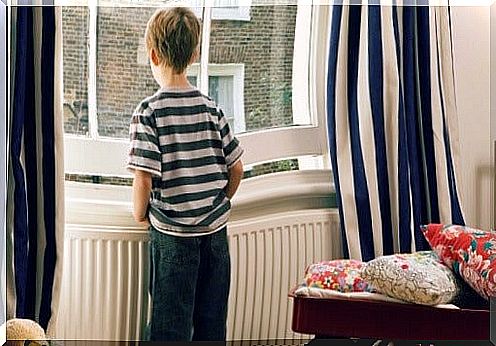At What Age Can Children Start To Go Out Alone?

It is not easy for parents to see how our little ones grow up and begin to separate from our side. Finding a balance between neglect and overprotection can be challenging. When children want to start going out on their own, fears and insecurity arise about whether the time is right.
There is no precise age when children should start going out alone. This will depend on many factors both internal and external to the infant himself. However, one of the elements that most influences when determining when the time has come is the degree of autonomy achieved by the child.
Starting to go out alone is a matter of autonomy
As a parent, it can be dizzying to think about letting go of the reins and allowing our children little lapses of freedom. Despite this, it is our duty and responsibility to raise capable and independent children. Autonomy is not something that is acquired automatically when reaching a certain age, it is a skill that is developed from the first years.
Therefore, it is important that we work on granting small tasks and responsibilities to infants within the home. Getting them used to setting the table, organizing their room or packing their backpack for school will help generate in the child a feeling of self-confidence and personal worth.

A child who has been entrusted with responsibilities from an early childhood will have developed the ability to reason and resolve situations. He will therefore be more prepared to face the world without his parents than a child who has always been overprotected.
Factors to take into account
In addition to the autonomy of the child, there are other factors that influence the decision of at what age to let children go out alone.
- The personality of the child. Some little ones will be more adventurous and determined, and others more fearful. The choice to start going to the sites alone is entirely personal and should come from the child himself. They should not be forced or compared with their peers.
- The distance of the route to be covered. It is not the same to allow him to go to the bakery across the street or to throw the garbage under the house, than to let him go alone to school which is 15 minutes away.
- The safety of the environment. If you live in a small and quiet town or in an urbanization, it will be safer to let the child go out alone with his friends than if you reside in a big city.
Guidelines to help you get out of the house alone
- There is no specific and valid age for all cases, but it is not recommended that children go out alone before the age of 9 or 10, since they do not have the cognitive maturity necessary to recognize and measure dangers.
- Give it autonomy progressively. Start by leaving him home alone while you go out on errands nearby. Later, switch roles and let him go without you. If you live in an urbanization, allow him to come down to play with his friends without your supervision.

- The first times he goes out without you to travel long distances, for example, the distance to school, it is preferable that he does it in the company of his brothers or friends.
- Before leaving home, offer him information adapted to his age on what dangers and situations he should take into account: avoid suspicious people, choose the safest routes, memorize the address and telephone number of his parents …
- On the other hand, we must avoid overwhelming and frightening them by listing excessive risks, especially if we do not accompany it with precise instructions on how to act. We want to warn you, but not create paralyzing insecurity.
- Introduce him to some situations and ask him how he would act in them. In this way, we help you reason and find coping solutions, in addition to giving value to your opinions, which will reinforce your self-confidence.
- Carry out trials in which you progressively move away. These will serve to verify that the child has assimilated the instructions and to help him face difficulties that may arise the first times. In this way, it begins by accompanying him during the journey but allowing him to make the decisions. Later, allow the child to go alone in the front and you can supervise behind, until he finally feels ready to go completely alone.










